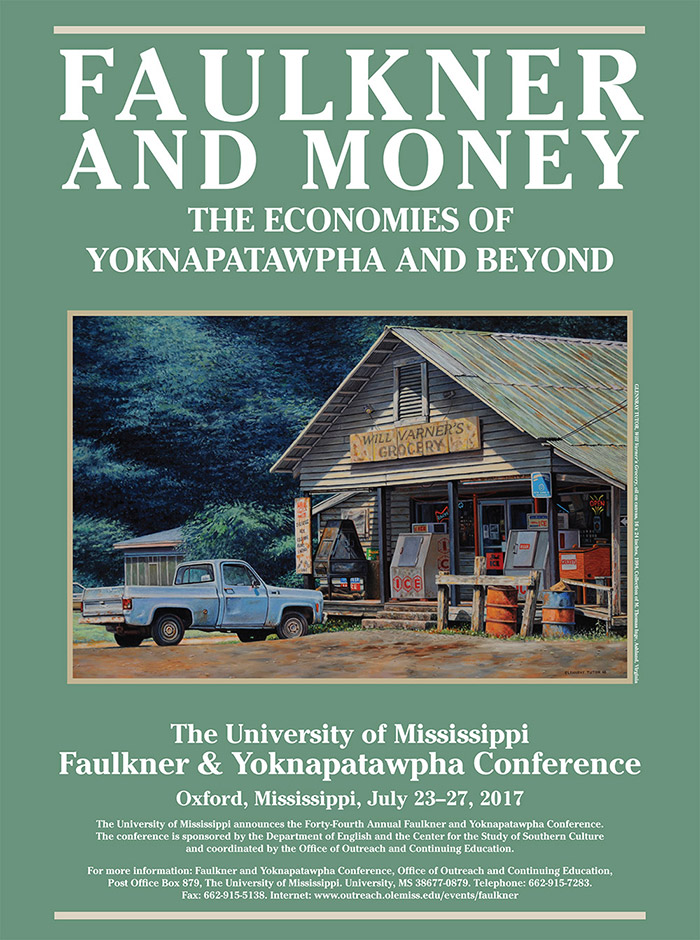
Panel. Money and Alienation
Location
Nutt Auditorium
Start Date
26-7-2017 3:30 PM
Description
- The Comedy and Gravity of Money in “Two Dollar Wife” and other works by William Faulkner / Caroline Miles, University of Texas, Rio Grande Valley
This paper looks at specific instances of economic exchange in Faulkner’s work that have gone largely unexamined, including the neglected story “Two Dollar Wife,” and considers how seemingly simple, often absurd and comic, references to dollar amounts and economic exchanges reveal Faulkner’s astute understanding of how money alienates human beings from themselves and others, as well as his awareness of the complex economic changes taking place in the South at different historical moments. Many of Faulkner’s references to economic exchange are charged with deep-seated anxieties, not only about the nature of money itself, but about unsettling new relations to money related to social identity, economic upheaval, and industrialism as the South struggled to transition to an increasingly capitalist economy that in particular gave new freedoms and economic agency to formerly repressed groups in society. - Light in August: Estrangement and the Medium of Money / Terrell Tebbetts, Lyon College
This essay traces the estrangement various characters endure in Light in August, locates the source of estrangement in the community’s pattern of projecting on and crucifying those whom it considers deviant, and identifies commodification and its agent money as the repeated means by which the community carries out this estrangement. With its focus on the role of money (cash), the essay complements Richard Godden’s study of the role of credit in creating debt peonage. It concludes by sketching similar patterns in novels Faulkner published after LIA.
Relational Format
Conference proceeding
Recommended Citation
Miles, Caroline and Tebbetts, Terrell L., "Panel. Money and Alienation" (2017). Faulkner and Yoknapatawpha Conference. 21.
https://egrove.olemiss.edu/fy/2017/schedule/21
COinS
Jul 26th, 3:30 PM
Panel. Money and Alienation
Nutt Auditorium
- The Comedy and Gravity of Money in “Two Dollar Wife” and other works by William Faulkner / Caroline Miles, University of Texas, Rio Grande Valley
This paper looks at specific instances of economic exchange in Faulkner’s work that have gone largely unexamined, including the neglected story “Two Dollar Wife,” and considers how seemingly simple, often absurd and comic, references to dollar amounts and economic exchanges reveal Faulkner’s astute understanding of how money alienates human beings from themselves and others, as well as his awareness of the complex economic changes taking place in the South at different historical moments. Many of Faulkner’s references to economic exchange are charged with deep-seated anxieties, not only about the nature of money itself, but about unsettling new relations to money related to social identity, economic upheaval, and industrialism as the South struggled to transition to an increasingly capitalist economy that in particular gave new freedoms and economic agency to formerly repressed groups in society. - Light in August: Estrangement and the Medium of Money / Terrell Tebbetts, Lyon College
This essay traces the estrangement various characters endure in Light in August, locates the source of estrangement in the community’s pattern of projecting on and crucifying those whom it considers deviant, and identifies commodification and its agent money as the repeated means by which the community carries out this estrangement. With its focus on the role of money (cash), the essay complements Richard Godden’s study of the role of credit in creating debt peonage. It concludes by sketching similar patterns in novels Faulkner published after LIA.

